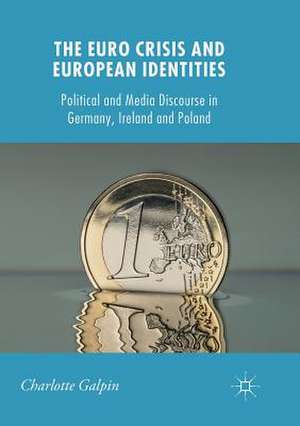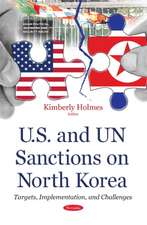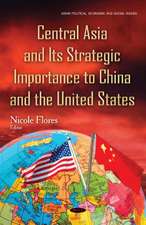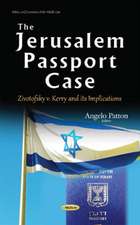The Euro Crisis and European Identities: Political and Media Discourse in Germany, Ireland and Poland: New Perspectives in German Political Studies
Autor Charlotte Galpinen Limba Engleză Paperback – aug 2018
| Toate formatele și edițiile | Preț | Express |
|---|---|---|
| Paperback (1) | 637.28 lei 6-8 săpt. | |
| Springer International Publishing – aug 2018 | 637.28 lei 6-8 săpt. | |
| Hardback (1) | 642.68 lei 6-8 săpt. | |
| Springer International Publishing – 5 iul 2017 | 642.68 lei 6-8 săpt. |
Din seria New Perspectives in German Political Studies
-
 Preț: 384.31 lei
Preț: 384.31 lei -
 Preț: 391.61 lei
Preț: 391.61 lei -
 Preț: 410.07 lei
Preț: 410.07 lei -
 Preț: 389.70 lei
Preț: 389.70 lei - 15%
 Preț: 643.00 lei
Preț: 643.00 lei -
 Preț: 387.75 lei
Preț: 387.75 lei - 15%
 Preț: 637.93 lei
Preț: 637.93 lei - 15%
 Preț: 642.68 lei
Preț: 642.68 lei -
 Preț: 386.39 lei
Preț: 386.39 lei - 15%
 Preț: 644.49 lei
Preț: 644.49 lei - 15%
 Preț: 648.24 lei
Preț: 648.24 lei -
 Preț: 388.72 lei
Preț: 388.72 lei -
 Preț: 390.63 lei
Preț: 390.63 lei -
 Preț: 390.25 lei
Preț: 390.25 lei -
 Preț: 389.70 lei
Preț: 389.70 lei -
 Preț: 390.63 lei
Preț: 390.63 lei - 15%
 Preț: 643.65 lei
Preț: 643.65 lei - 15%
 Preț: 643.84 lei
Preț: 643.84 lei -
 Preț: 384.86 lei
Preț: 384.86 lei -
 Preț: 390.63 lei
Preț: 390.63 lei - 15%
 Preț: 641.03 lei
Preț: 641.03 lei -
 Preț: 387.38 lei
Preț: 387.38 lei -
 Preț: 389.49 lei
Preț: 389.49 lei -
 Preț: 393.52 lei
Preț: 393.52 lei - 15%
 Preț: 640.55 lei
Preț: 640.55 lei -
 Preț: 385.84 lei
Preț: 385.84 lei - 15%
 Preț: 638.11 lei
Preț: 638.11 lei - 15%
 Preț: 639.73 lei
Preț: 639.73 lei - 15%
 Preț: 638.43 lei
Preț: 638.43 lei -
 Preț: 384.70 lei
Preț: 384.70 lei -
 Preț: 389.31 lei
Preț: 389.31 lei - 15%
 Preț: 641.71 lei
Preț: 641.71 lei -
 Preț: 389.11 lei
Preț: 389.11 lei
Preț: 637.28 lei
Preț vechi: 749.73 lei
-15% Nou
Puncte Express: 956
Preț estimativ în valută:
121.94€ • 127.66$ • 100.90£
121.94€ • 127.66$ • 100.90£
Carte tipărită la comandă
Livrare economică 05-19 aprilie
Preluare comenzi: 021 569.72.76
Specificații
ISBN-13: 9783319846989
ISBN-10: 3319846981
Pagini: 259
Ilustrații: XV, 259 p.
Dimensiuni: 148 x 210 mm
Greutate: 0.33 kg
Ediția:Softcover reprint of the original 1st ed. 2017
Editura: Springer International Publishing
Colecția Palgrave Macmillan
Seria New Perspectives in German Political Studies
Locul publicării:Cham, Switzerland
ISBN-10: 3319846981
Pagini: 259
Ilustrații: XV, 259 p.
Dimensiuni: 148 x 210 mm
Greutate: 0.33 kg
Ediția:Softcover reprint of the original 1st ed. 2017
Editura: Springer International Publishing
Colecția Palgrave Macmillan
Seria New Perspectives in German Political Studies
Locul publicării:Cham, Switzerland
Cuprins
Chapter 1. Introduction.- Chapter 2. European Identities at Times of Crisis.- Chapter 3. European Identity Discourses in Germany, Ireland and Poland.- Chapter 4. Has Germany Fallen Out of Love with Europe?.- Chapter 5. Irish Identity and the Utility of Europe.- Chapter 6. The Battle for the European Core: Polishness as Europeanness?.- Chapter 7. Identity Continuity, Policy Change? Actors, Institutions and Identities.- Chapter 8. Euroscepticism, Identity and Democracy in the EU.
Notă biografică
Charlotte Galpin is a Postdoctoral Researcher at the University of Copenhagen, Denmark. She holds a PhD in Political Science and International Studies from the University of Birmingham and previously taught at the University of Bath. Her research interests include European identities and solidarity, Euroscepticism and the European public sphere, and EU democracy.
Textul de pe ultima copertă
This book builds upon our knowledge of the far-reaching economic, political and social effects of the Euro crisis on the European Union by providing a unique study of European identities. In particular, it considers the impact on the construction of European identities in political and media discourse in Germany, Ireland and Poland—three countries with profoundly different experiences of the crisis and never before compared in a single study. Offering an original insight into the dynamics of identity change at moments of upheaval, the author argues that political and media actors in the early stages of the crisis drew on long-standing identities in order to make sense of the crisis in the public sphere. European identity discourses are thus resilient to change but become central to legitimising and contesting bailouts and further economic integration. As such, the author challenges the commonly held view that identities change dramatically at times of crisis but argues that this very resilience helps to understand the EU’s current divisions. The study of identity during the Euro crisis sheds important light on the prospects for European solidarity as well as on the future of the single currency as an identity-building project. The book will be of particular interest to students and scholars in the fields of EU politics, comparative European politics, and identity politics.
Caracteristici
Uniquely compares Germany, Ireland and Poland to analyse the Euro crisis and European identity Demonstrates that representations of European identities can have important and transformative effects on EU policy Develops the debate surrounding the EU’s legitimacy and policy debates about European solidarity
















